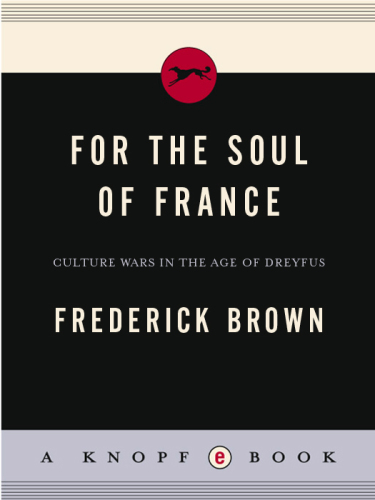
For the Soul of France
کتاب های مرتبط
- اطلاعات
- نقد و بررسی
- دیدگاه کاربران
نقد و بررسی

November 1, 2009
A scholar of French literature and culture traces the troubling history of Catholic intolerance, xenophobia and anti-Semitism during the last decades of 19th-century France.
With the Franco-Prussian war of 1870–71, Napoleon III's abdication and the subsequent civil agitation during the Paris Commune, reactionaries in France were pushing hard for ascendancy. Brown (Flaubert, 2006, etc.) looks closely at the time period in terms of the moral, intellectual and cultural fabric of the nation. France did not separate church from state, as underscored by the Catholic Church's round condemnation of"depraved fictions of innovators" such as the publication of Ernest Renan's Vie de Jsus in 1863, which depicted Jesus as a Romantic hero. By the early 1870s, the Church was in revival, eager to"to forgive France her crimes," and embarked on a shrine to"national salvation" in 1873: Montmartre's Basilica of Sacr-Cœur. Brown traces the careers of significant leaders on both sides, including provisional president Louis-Adolphe Thiers, Marshal Patrice de MacMahon, who served as president of the Third Republic under a program of"moral order"; Republican chief Lon Gambetta; and General Boulanger, the nostalgic embodiment of"France bold and triumphant." While France presented a face of modern innovation to the world in the form of successive Exposition Universelles and the Eiffel Tower, undercurrents of ugly anti-Semitism were being fed as the far right scrambled for scapegoats after the crash of the Union Gnrale in 1882, the Panama scandals in the following years and, of course, the infamous Dreyfus Affair. Brown subtly foreshadows the path toward the Vichy regime, but adds little to the scholarship about this explosive period in French history.
A well-composed survey, but more summary than original interpretation.
(COPYRIGHT (2009) KIRKUS REVIEWS/NIELSEN BUSINESS MEDIA, INC. ALL RIGHTS RESERVED.)

Starred review from January 15, 2010
In this richly illustrated volume, Brown (Flaubert: A Biography), a prize-winning scholar of French literature, seeks to recount the mood and mindset of fin de si]cle France by examining a series of key events, incidents, and episodes that reveal and reflect the ideological rifts that gripped the nation in the last three decades of the 19th century. Brown identifies the culture wars as contests between secularism and religiosity, science and superstition, enlightenment and salvation, modernism and tradition, cosmopolitanism and nationalism. He demonstrates how the battle lines were drawn, how particular events exacerbated them, and how certain individuals and groups exploited them. Using examples both well known (the coopting of the legend of Joan of Arc) and not so well known (the story of the Charity Bazaar martyrs of 1897), he brilliantly explains how the cultural divides that culminated in the Dreyfus affair had deep roots. For decades prior to the 1890s, conservatives and antirepublicans, he argues, had come to believe that the true France was under siege from alien forcesJews foremost among them. VERDICT An important work of cultural and intellectual history, recommended for all informed readers in French history.Marie Marmo Mullaney, Caldwell Coll., N.J.
Copyright 2010 Library Journal, LLC Used with permission.

December 1, 2009
Departing from biographies of Zola (1995) and Flaubert (2006), Brown enters the French social and political milieu in which those novelists works were set. It was vengeful after national defeat by Prussia in 1870, and venomous following the civil war of 1871. Perfectly evoking those moods, Brown advances the attitudes and aspirations of the factions into which French society had fractured, as expressed through the popular press and as interpreted by politicians jockeying for position. Riding a Catholic religious revival, monarchists rallied for a restoration, but the Bourbon pretender stymied their plan. A surge by secularists then sharpened political and religious animosities, so that by the 1880s, France seemed eager for another man on horseback: he appeared as General Georges Boulanger. If, after Boulangers vertiginous rise and fall, all factions had to reconcile to France being a republic, for better or worse, then the republics relation to the Catholic Church, to business scandals, and to anti-Semitism revealed by the Dreyfus affair still convulsed the politics of the 1890s. A master of the fin de si'cle, Brown will engross Francophiles.(Reprinted with permission of Booklist, copyright 2009, American Library Association.)

























دیدگاه کاربران